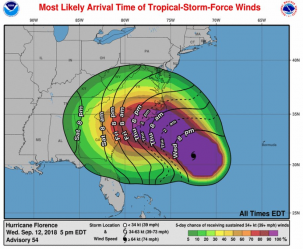NASA-GISS4
-

Why Hurricane Florence is Unusual and Dangerous
Experts from around the Earth Institute weigh in on some of the biggest questions about Hurricane Florence.
-

Hurricane Florence: Resources for Journalists
Our hurricane and disaster experts are standing by to answer media questions about hurricane physics, emergency response, climate change, and more.
-

AGU Names Three Earth Institute Scientists as 2018 Fellows
The American Geophysical Union, the world’s largest earth and space science society, made the announcement on Thursday morning.
-

Pictures Worth a Thousand Words: How Satellite Imagery is Improving Agriculture in Developing Countries
A partnership between two research institutes is helping to promote sustainable land-use practices in African nations.
-

American Geophysical Union 2017: Key Events From the Earth Institute
A chronological guide to key talks and other events presented by Columbia University’s Earth Institute at the American Geophysical Union 2017 meeting.
-

Study: Overuse of Water Threatens Global Food Supply
In recent years, scientists have revealed that we are depleting our global groundwater reserves at an alarming rate. Now researchers have shown that a significant share of this unsustainable water use fuels the global food trade, which means water exhaustion in supplier nations could ripple outward, causing food crises half way across globe.
-

How We Know Today’s Climate Change Is Not Natural
Despite the many climate “skeptics” in key positions of power today, 97 percent of climate scientists agree that the warming of Earth’s climate over the last 100 years is mainly due to human activity. Why are they so sure?
-

Trump’s Unifying Opportunity: Food Security
A sound strategy to secure the nation’s food supply and reduce its vulnerability within and beyond our borders will be a major step towards making America and the world more resilient in the face of increasing uncertainty.
-

2016 Sets Another Record for Warmth
The news doesn’t come as a surprise to scientists and others who’ve been watching, but marks a milestone nonetheless: 2016 was the warmest year on record, dating back to the start of modern record keeping in 1880.

By studying thousands of buildings and analyzing their electricity use, Columbia Climate School Dean Alexis Abramson has been able to uncover ways to significantly cut energy consumption and emissions. Watch the Video: “Engineering a Cooler Future Through Smarter Buildings“
